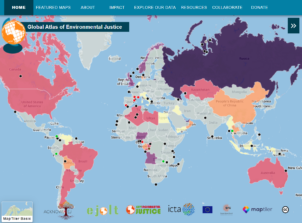
Browse the conflicts in the EJAtlas linked to the French oil major TotalEnergies analyzed in the research article entitled: “The political ecology of oil and gas companies: TotalEnergies and post-colonial exploitation to concentrate energy”
This featured map collects the socio-environmental conflicts related to TotalEnergies operations along fossil fuels commodity chains, from exploration blocks, to exploitation wells, LNG terminals, pipelines, refineries and petrochemicals. It also includes the conflicts in the “new energies” sector.
The energy that TotalEnergies concentrates predominantly in Europe is extracted from the world peripheries and transported along energy corridors leaving a trail of social, health and environmental impacts documented in each of the cases. In turn, local communities and environmental justice organisations resist the encroachment on their territories and ways of life and organise campaigns to oppose the companies’ projects. Each of the cases documented collect the stories of resistance against TotalEnergies all around the world.
To assist in the visualisation of the Political Ecology of TotalEnergies, the user can activate extra map layers showing the fossil fuel production levels per country, the sites of oil and gas extraction, the LNG terminals, and oil and gas terminals participated by the company. Click on “Legend” below to explore the options. Additional information layers were kindly provided by Global Energy Monitor and LINGO’s Protected Carbon project.
We invite you to browse the different conflicts, each of them with their own description, images, and coded variables. The ensemble of cases is analysed in the research paper Llavero-Pasquina, M., Cantoni, R., Navas, G. Martínez-Alier, J. (2023). The political ecology of oil and gas corporations: TotalEnergies and post-colonial exploitation to concentrate energy in industrial economies. In Energy Research & Social Science. Which you can read in the following link:

The project ENVJUSTICE has received funding from the European Research Council (ERC) under the European Union’s Horizon 2020 research and innovation programme (grant agreement No. 695446)